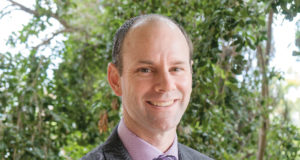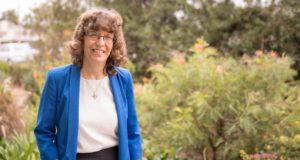Knowing how to balance convictions of faith and political expediency is a challenge at election time, but being politically engaged takes more than showing up on polling day. Rohan Salmond explores.
The debates are on, the attack ads are out and the campaign is in full-swing. On 7 September, Australia will once again make its triennial pilgrimage to the polls and elect a new parliament. After three years of high drama in minority government this might come as a relief for some, but the competing priorities between faith and politics make navigating the political landscape tricky for many in the church.
Even within the general population, ambivalence and disengagement with Australia’s democratic system is high. A recent study conducted by the Australia Institute and released by ANZSOG Institute for Governance indicated well over half of Australians could not remember conducting any political activity—including signing a petition or participating in a protest—in the last two or three years.
That pre-existing disengagement combined with ever-narrowing differences in policy between the two major parties has led to a feeling of deep ambivalence within the electorate towards the upcoming election.
“There is a lot of frustration out in the Australian community,” says John Beckett, National coordinator for Micah Challenge Australia.
“There doesn’t seem to be a clear vision for the nation, and there seems to be a lack of clear policy about where we’re going … a lot of people feel like they don’t have clear distinctions between parties and are not exactly sure where they’ll be voting.”
National director of UnitingJustice, Rev Elenie Poulos agrees. “We fight over policy in a very, very narrow band, and the differences between political parties on major policy issues are actually very small.
“It becomes hard for people to clearly identify which policies across a range of issues are more reflective of the kind of Australia they want to build. When it comes to policy in this country, the devil is actually in the detail, not in the big picture.”
Salt and light
Finding a candidate to support is not easy. Christian voters often have a range of priorities that transgress party lines, confounding the traditional left-right spectrum of politics. There are a number of “Christian” parties running in this election, but Christians in Australia hold an array of political ideologies and do not form a neat voting bloc, meaning these parties do not accurately represent the views of Christians as a whole.
“There’s never a perfect candidate, never a perfect leader, so we’re always making choices about candidates and parties that are less than ideal. There’s no one party that fully embraces people’s Christian traditions or their values and so you’re always making choices about which way to go,” says Mr Beckett.
But separating your personal faith from your political engagement is not an option.
“Where we sit at Micah Challenge, we are wholeheartedly sold on the idea that our faith needs to be expressed in the political space and in the social space; we need to engage as Christians. We are called to be salt and light and we’re called to participate. You can only be salt and light if you are participating and having your voice in the process,” says Mr Beckett.
The lesser of two evils
This imperfect translation of Christian ethics into the political realm means casting a vote requires a certain level of pragmatism. Dr John Harrison, University of Queensland senior lecturer in Journalism and Communication has an academic background studying politics and religion. For him, politics is very much the art of compromise, even for Christians.
“I think it’s very easy for Christians to take a pure and idealist position and be critical of those who have to make life-and-death decisions in the political arena.
“I think the Uniting Church is particularly at risk here, and I have been known to publicly castigate both the culture and institution of the Uniting Church for being ‘the Greens at prayer’. Political ethics is a lot more complicated than we might think.
“Ethically, putting a mark on a ballot paper in the voting booth inevitably involves deciding among the lesser of two evils,” he says.
Knowing when to make those compromises is never easy. A completely unbending attitude risks contributing just as little to the political conversation as not speaking up at all. How then should we approach casting our vote in a way which honours our Christian convictions?
“I think if we’re confident we’re using our voice and our vote for … the benefit of the poor and the marginalised and the oppressed, then there are certainly times when as a community and as individuals we need to take a stand and not be moved on those things,” says Mr Beckett.
Beyond elections
“Such a conundrum carries with it the imperative of civic engagement in-between elections. This engagement is about bringing the values of the Kingdom of God into the secular, political domain,” says Dr Harrison.
Being engaged goes beyond the act of voting.
“Your vote is just one part of the expression of your voice into the political space. Your voice into political leadership doesn’t stop with your vote,” says Mr Beckett.
“You need to choose the candidate and the party that most closely reflects what you think about the world and how it should be, and then continue to speak on issues where you disagree with them and can continue to voice your concerns about those issues.
“[At Micah Challenge] we do a lot of thinking about the prophetic role. Most people think that the prophets were mainly critics that always stood up against injustice.
“But for a large part of their function, the prophets, particularly in the Old Testament, were constructive. They spoke about what they were for and what God was for and sought to give a vision of what society could look like. So there’s both a constructive and critical function to the prophetic role.”
Uniting in action
Being a constructive voice during and beyond election time requires an engagement with the issues affecting the community, as well as getting to know the representatives that are sent to Parliament House.
“Many Uniting Churches around the country have already been holding community electoral forums and I think this is a really wonderful outreach into the community that the church can offer,” says Ms Poulos.
“As a church you could also make an appointment to see your local member. You could take your minister and a few other interested people in the congregation to talk about an issue that matters to that congregation. You could also go as an individual; you could write letters or email.
“The thing about our democracy is the more people engage at a local level with their local members and their state senators, the more vibrant our democracy becomes.”
Casting a vote in line with your values is not as straightforward as following a “how to vote” card on polling day. In politics, weighing the competing priorities can sometimes feel overwhelming, but being engaged is a service to the community and ourselves, spiritually.
“Regardless of your political inclinations I think the most important thing to maintain the strength of our democracy is to be informed and to get out there and to do whatever we can to help have robust and full discussion in our community so we can be informed, so we can listen to different opinions and so we can grow together as a community,” says Ms Poulos.
John Beckett encourages Christians not to give up hope. “Frustration is fine, but don’t become disillusioned. There will be times in any political cycle when we’re frustrated with what’s going on and we don’t see what we want to see happening in the timeframes that we would want to see those things.
“But we have a God who has promised that his new creation will come. We have no reason to fear.”
Audio from these interviews can be found at journeyonline.com.au
 JourneyOnline
JourneyOnline







